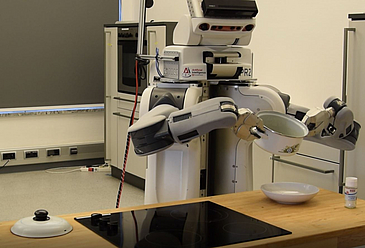The university uses the "ArnetMiner" - a so-called "data mining" service that evaluates large amounts of scientific data - to create the ranking. This enables the search for experts in a field, but also the analysis of networks between scientists and the assessment of the influence of their scientific work on the respective field. In this ranking, our CRC 1232 subproject leaders Michael Beetz and Rolf Drechsler are at the top of the list.
Both scientists from the field of artificial intelligence were able to impress with their specialist publications.
Michael Beetz occupies 4th place in the robotics category: "One of our special features is the holistic approach we take to robotics and artificial intelligence," he explains. "We combine the classic methods of AI with very powerful new methods such as machine learning to make systems more robust." The goal: to design the AI systems in such a way that their procedure is understandable and explainable at all times, says Beetz.
In addition to Rolf Drechsler, he is an associate subproject leader of P01 and plans to become involved in the SFB "Farbige Zustände" with another subproject for phase 2.
Rolf Drechsler is represented in the Chip Technology category. He is head of the subprojects P01 and P02. While TP P01 deals with the predictor function and data modelling of experimental data sets, TP P02 is responsible for heuristic, statistical and analytical design of experiments. Based on the respective state of knowledge and its uncertainties, TP P02 develops experimental designs for the determination of micro-process parameters leading to the desired material properties.
The SFB is pleased to have these influential scientists in its midst and congratulates them on this award.
Press Release of the University of Bremen

![[Translate to English:] Zur Startseite des SFB Farbige Zustände](/fileadmin/user_upload/sites/sfb1232/Logos_und_Bilder/SFB1232-quer.png)
